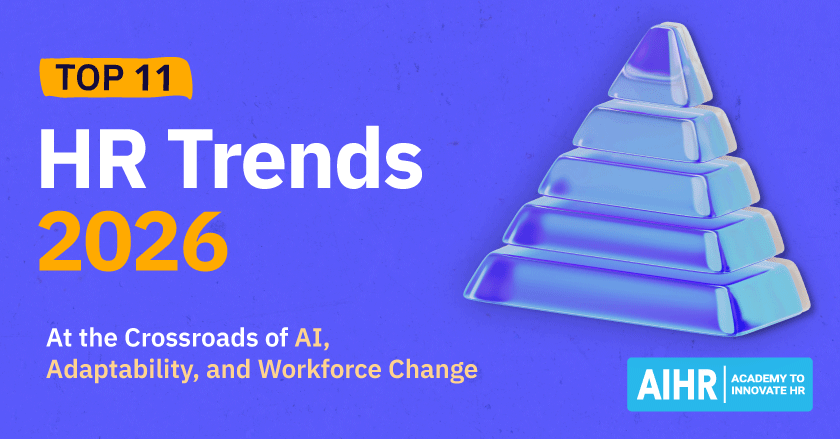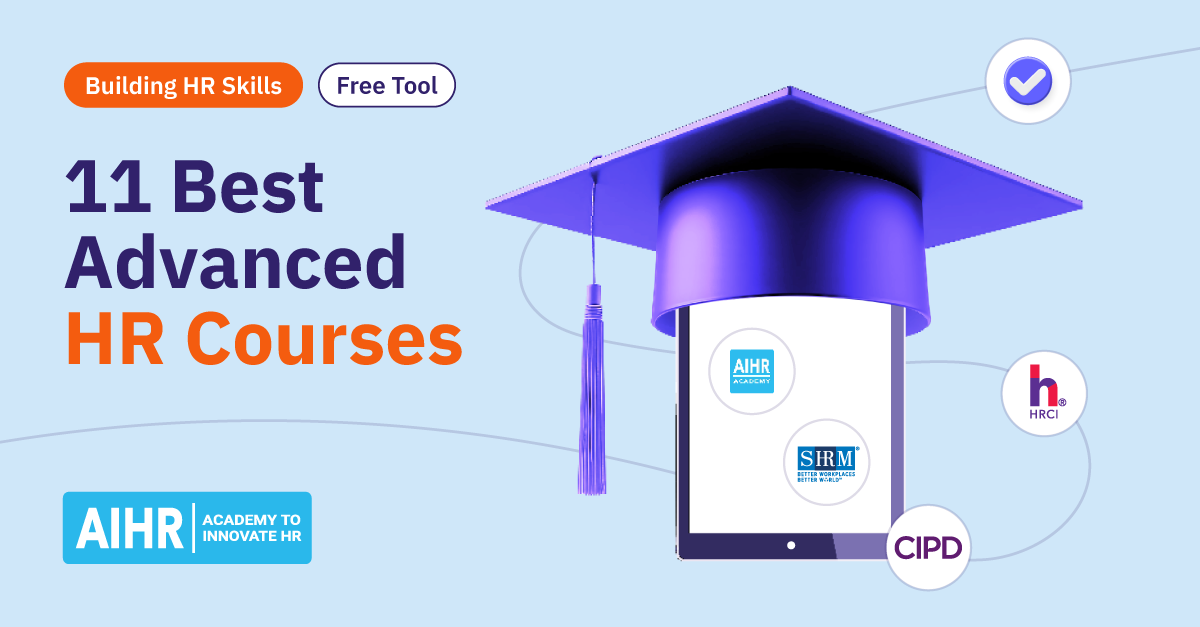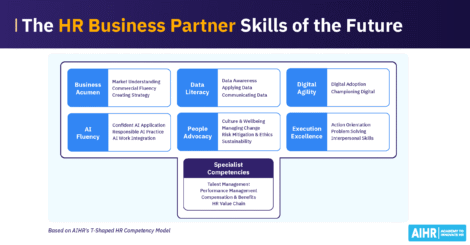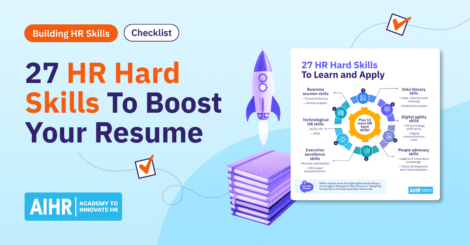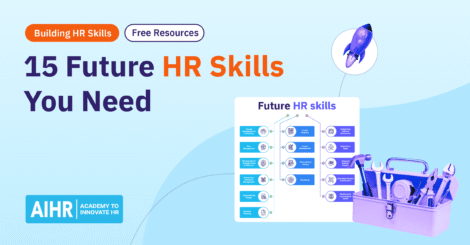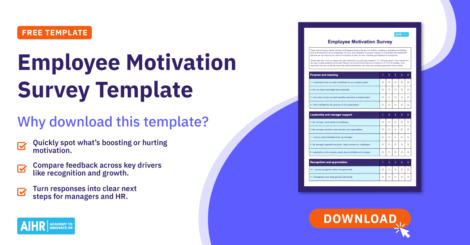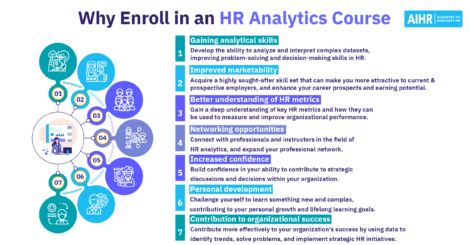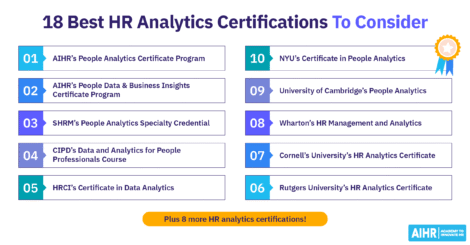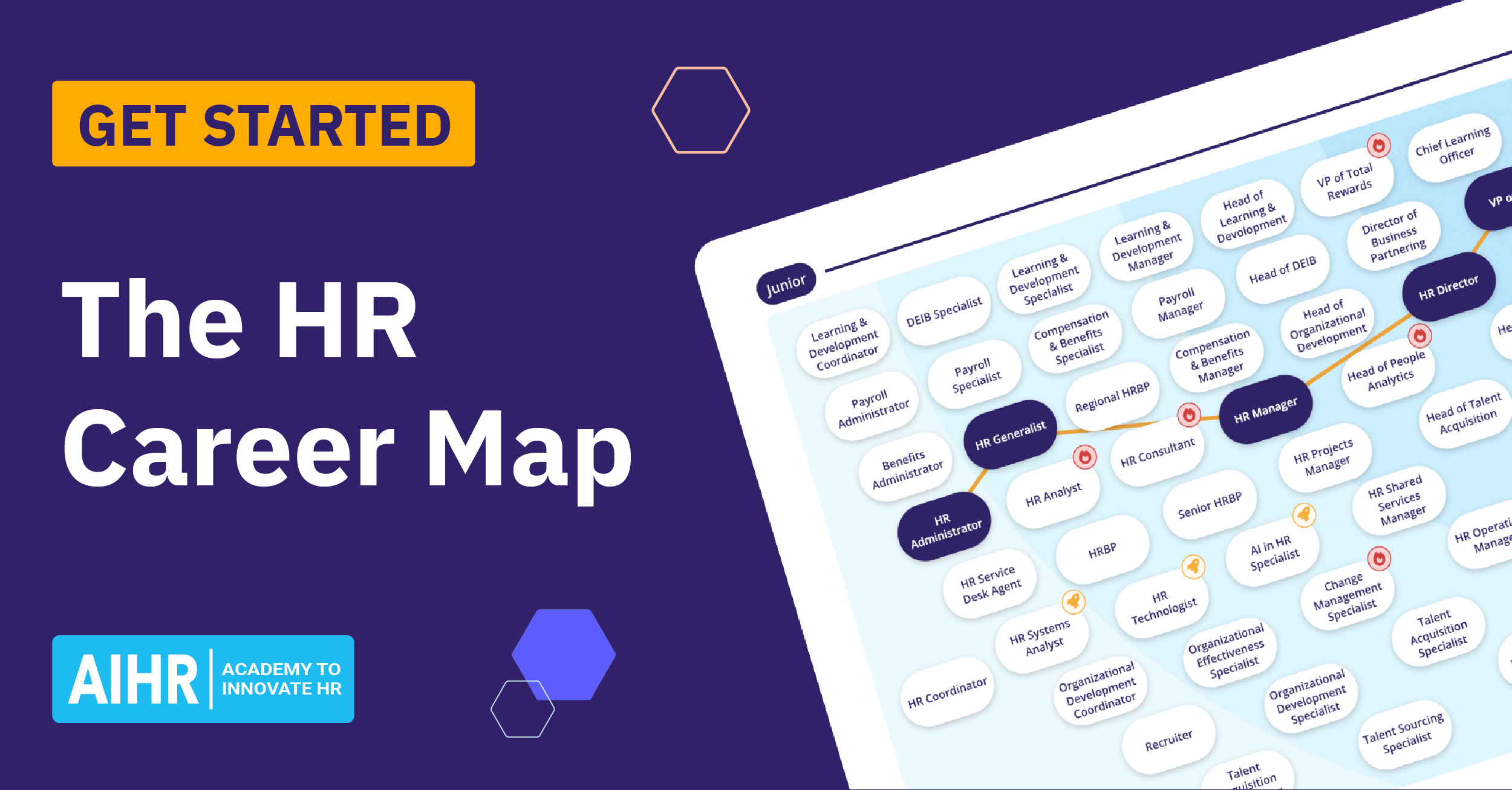Only 41% of HR professionals possess the competency to keep up with HR’s digital transformation — a worrying statistic amid strategic HR’s growing importance. Still, there are many HR courses that can help you upskill yourself and ensure you adapt well to changes in the HR function.
Advanced HR courses can help you deal with issues like managing remote teams, improving employee wellbeing, and promoting Diversity, Equity, Inclusion, and Belonging (DEIB). This will benefit your company and its employees and ensure you remain effective and relevant in your role.
Let’s take a look at the advantages of advanced HR courses and the 11 best courses that will help you progress in your function as an HR professional.
Contents
Why take advanced HR courses?
11 best advanced HR courses, certificate programs, and exams
1. HR Manager Certificate Program (AIHR)
2. Strategic Talent Acquisition Certificate Program (AIHR)
3. Talent Management & Succession Planning Certificate Program (AIHR)
4. Diversity, Equity, Inclusion & Belonging Certificate Program
5. Digital Change Management online course (AIHR)
6. Mini MBA for HR Online Training Course
7. AI + HI Specialty Credential (SHRM)
8. SHRM Certified Professional
9. Senior Professional in Human Resources Certification (HRCI)
10. Global Professional in Human Resources
11. CIPD Advanced Diploma in Strategic People Management (Level 7)
Why take advanced HR courses?
Taking advanced HR courses helps HR professionals stay relevant and add real value to their companies as they face new challenges. While traditional HR functions (e.g., workforce administration, compliance, and recruitment) are still important, organizations now require HR to take on more strategic roles.
As businesses evolve, HR professionals need business acumen, change management skills, data literacy, and tech savviness to tackle different issues. One example is the growing mismatch between the skills organizations need and existing HR capabilities. Despite job postings calling for data-driven and digital HR skills, HR professionals tend to be more proficient in generic operational tasks.
This gap extends into key areas like leadership, management, and training and can prevent HR from playing a more impactful role in organizational growth. There’s clearly an urgent need for HR to shift its focus from transactional tasks to those of greater strategic value (e.g., workforce planning, leadership development, and aligning HR strategies with business objectives).
“Skills develop through the application of knowledge and experience. As an HR professional, that means you have to get exposure to both learning and practical opportunities. HR courses are a great way to upskill yourself, as they usually have theoretical components as well as practical examples and case studies to help you develop competence in particular areas.”

Harvard Business Publishing Corporate Learning has identified key trends business leaders across industries are focusing on:
- Digital technology impact: How technological advancements are reshaping not only HR but also business operations.
- The realities of a changing workforce: Shifting demographics, remote work, and the need for more agile workforce management.
- The rise of the social enterprise: A focus on organizational responsibility, employee wellbeing, and corporate culture.
- The growing skills gap: The need to address the disparity between available skills and those required to stay competitive.
Upskilling in areas like digital HR transformation, strategic thinking, and financial literacy will help you become a strategic partner in your company. These skills will not only boost confidence but also enable you to contribute more effectively to organizational goals.
HR tip
Focus on more than just operational tasks: HR professionals often get caught up in day-to-day administrative duties, neglecting their roles’ strategic aspects. To add real value to your job and organization, it’s important to balance operational responsibilities with broader strategic initiatives, like workforce planning and talent management.
Benefits of developing advanced HR skills
- Enhanced business acumen: A comprehensive understanding of business operations, including financial planning and market dynamics, allows you to tailor strategies aligned with business goals.
- Effective change management: With advanced change management skills, you can lead major changes more efficiently, ensuring smoother transitions and greater organizational resilience.
- Improved data literacy: You can use workforce analytics for better decision-making. This includes predicting workforce trends, identifying skills gaps, and making informed decisions about talent management, performance improvement, and succession planning.
- Efficient tech integration: Expertise in digital HR tools and platforms will enable you to implement and manage systems that streamline processes like recruitment, onboarding, and performance tracking.
- Alignment with business needs: You can lead leadership development, skill-building programs, and talent strategies directly aligned with business growth and transformation goals.
- Strategic contribution: As HR transitions from a largely administrative to a more strategic role, advanced skills can help you drive organizational culture, improve workforce planning, and contribute to long-term business strategy.
- Greater influence: You can gain influence at the executive level, ensuring that HR plays a central role in decision-making. This helps set up company policies and practices for long-term success.
- Global HR competency: Advanced skills in cross-cultural management and global HR practices can help you manage a diverse workforce, navigate international labor laws, and support international expansion initiatives effectively.
- Better crisis management: You can lead your organization through unexpected challenges such as economic downturns, pandemics, or mergers and acquisitions, ensuring business continuity and employee wellbeing.
11 best advanced HR courses, certificate programs, and exams
Certificate programs like what AIHR offers are a great way to build foundational skills, while AIHR’s courses tackle more contemporary issues that reflect important emerging topics. At the same time, accreditations and certifications ensure continuous learning and upskilling that add to your credibility as an HR professional.
Here are the top 11 advanced HR courses, certificate programs, and exams AIHR recommends:
1. HR Manager Certificate Program (AIHR)
- This program is for: HR professionals aiming to become strategic leaders or move into HR leadership roles.
- Format and duration: Online and self-paced; 20 hours over 10 weeks.
- The program covers: Organizational design, business administration, HR strategy, people management, and leadership skills.
- Cost: $1,125
- Find out more: HR Manager Certificate Program
2. Strategic Talent Acquisition Certificate Program (AIHR)
- This program is for: HR professionals and recruiters aiming to improve their talent acquisition and recruitment skills.
- Format and duration: Online and self-paced; 28 hours over 10 weeks.
- The program covers: Advanced sourcing strategies, recruitment marketing, and data-driven approaches to recruitment.
- Cost: $1,125
- Find out more: Strategic Talent Acquisition Certificate Program
3. Talent Management & Succession Planning Certificate Program (AIHR)
- This program is for: HR professionals focusing on workforce planning, leadership development, and succession strategies.
- Format and duration: Online and self-paced; 25 hours over 10 weeks.
- The program covers: Leadership development, talent pools, succession planning, and talent management strategies to sustain business goals.
- Cost: $1,125
- Find out more: Talent Management & Succession Planning Certificate Program

4. Diversity, Equity, Inclusion & Belonging Certificate Program (AIHR)
- This program is for: HR professionals who want to help drive DEIB at their organizations to create a welcoming, respectful workplace for all employees.
- Format and duration: Online and self-paced; 32 hours over 11 weeks.
- The program covers: Organizational culture, designing the desired culture, intercultural differences, and managing team diversity.
- Cost: $1,125
- Find out more: Diversity, Equity, Inclusion & Belonging Certificate Program
5. Digital Change Management online course (AIHR)
- This course is for: HR professionals leading digital transformation within their organizations.
- Format and duration: Online and self-paced; two modules over six hours.
- The course covers: Organizational change theories, managing resistance to change, and digital tools for change management.
- Cost: Part of the Digital HR 2.0 Certificate Program ($1,125) or available with Full Access Membership ($1,850 per year).
- Find out more: Digital Change Management online course
Learn the skills you need to keep up with digital transformation in HR
Being able to adapt to the rapid technological advancements that come with digital transformation and other impending changes is crucial for an HR professional.
In AIHR’s Digital HR 2.0 Certificate Program, you will work on real-world projects to develop the skills, expertise, and hands-on experience you’ll need to lead digital HR transformation at your organization.
This online, self-paced Certificate Program will also teach you to manage your digital projects more effectively and address resistance through better stakeholder communication.
6. Mini MBA for HR Online Training Course (AIHR)
- This course is for: HR professionals looking to develop business acumen to align HR strategy with business goals.
- Format and duration: Online and self-paced (four modules over five hours).
- The course covers: Competitive analysis, governance, strategy planning, and international business.
- Cost: Part of the HR Manager Certificate Program or available with Full Access Membership ($1,850 per year).
- Find out more: Mini MBA for HR online course
7. AI + HI Specialty Credential (SHRM)
- This course is for: HR professionals who want to explore the intersection of AI and human interaction in HR functions.
- Format and duration: Online and virtual learning sessions with self-paced modules over six weeks.
- The course covers: AI applications in HR functions like talent management and employee engagement, along with critical thinking for AI use.
- Cost: $1,830 for members, $2,105 for non-members.
- Find out more: SHRM AI + HI Specialty Credential
HR tip
Embrace digital and data skills: With the growing importance of data-driven decision-making and digital transformation, relying solely on traditional HR methods will affect the relevance of your job and skills. Continuously improving your data literacy and embracing technological changes will help you add value to your organization and ensure your role remains relevant.
8. SHRM Certified Professional
- This exam is for: HR professionals looking to earn recognized HR management certifications.
- Format and duration: Online and in-person options, with flexible testing; 134 questions in four hours.
- The exam covers: Competency-based HR principles, including business leadership, talent management, and HR operations.
- Cost: Varies by location and study mode.
- Find out more: SHRM Certified Professional
9. Senior Professional in Human Resources Certification (HRCI)
- This exam is for: Senior HR professionals responsible for HR department goals and strategic planning.
- Format and duration: Computer-based, with 115 mostly multiple-choice questions over 2.5 hours; online or at Pearson VUE testing centers.
- The exam covers: Strategic HR leadership, policy-making, and business strategy alignment.
- Cost: $100 application fee and $495 exam fee.
- Find out more: SPHR Certification
10. Global Professional in Human Resources (HRCI)
- This exam is for: HR professionals with multinational HR responsibilities.
- Format and duration: Computer-based, with 100 mostly multiple-choice questions over two hours; online or at Pearson VUE testing centers.
- The exam covers: Global HR strategies, policy development for global growth, and managing HR disciplines in international contexts.
- Cost: $100 application fee and $495 exam fee.
- Find out more: GPHR Certification
11. CIPD Advanced Diploma in Strategic People Management (Level 7)
- This course is for: HR professionals aiming to take on senior roles such as Head of HR or Director of People.
- Format and duration: Blended learning (online and in-person) over 16 to 24 months.
- The course covers: Strategic workforce planning, talent management, diversity and inclusion, and people analytics.
- Cost: Varies by region and provider.
- Find out more: CIPD Advanced Diploma in Strategic People Management
HR tip
Invest in continuous learning: You risk falling behind in your role and industry if you don’t prioritize upskilling and reskilling. Continuous learning in areas like business acumen, leadership, and change management is essential for long-term success.
To sum up
Advanced HR courses are a key solution for professionals looking to enhance their expertise in areas like data analytics, technology integration, and leadership. By investing in yourself through continuous learning, you’ll be better equipped to tackle the challenges HR will face over the next five years.
This will help you stay relevant and impactful in your role, preparing you to adapt to new technologies, changing demographics, and the increasing importance of strategic HR functions. It will also ensure you add value as a strategic partner in your organization, contributing effectively to its growth and long-term success.


